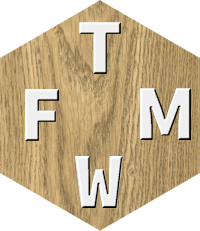New members’ briefing
“My playing came on more in 6 months of playing with others than in 20 years of practising solo”
Aim
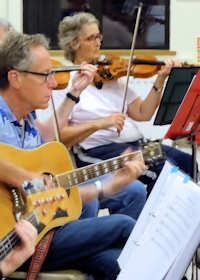 Twyford Folk Music Workshop is aimed at classical players who are interested in
folk music, and folk, country dance & morris players who want to improve
their sight reading. They are not “sessions” nor performances.
Twyford Folk Music Workshop is aimed at classical players who are interested in
folk music, and folk, country dance & morris players who want to improve
their sight reading. They are not “sessions” nor performances.
The style has been described as “where orchestral meets folk”.
Meetings
We meet at St Mary’s Church Centre, Twyford, on the first Thursday of the month, from 8.00 pm prompt to 10.00 pm.
There is usually no meeting in August (holidays), and we might occasionally meet on a different day of the month. Check the home page for the date of the next meeting before attending.
There is a charge of £5.00¹ for the evening, including half-time tea or
coffee. No subscription is required: you only pay when you turn up.
Sheet music
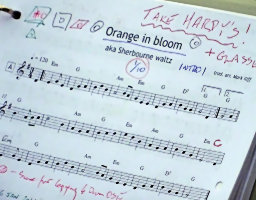 Scores for all the music we play are available from the
Members’ area of this website – access
details are given after joining.
Scores for all the music we play are available from the
Members’ area of this website – access
details are given after joining.
We also use the 200-page Paul Hardy Session tunebook, which you can download free. A printed copy costs £14.00¹ (inc. P&P). You don’t need the Hardy book, but as a source of 600 tunes many members find it attractive.
There are not many power sockets in the room we use, so if you view music on a tablet make sure it is charged before the workshop.
Workshop format
Workshops follow the same pattern as the typical programme. I email the programme in advance, including access details for the Members’ area so you can obtain the scores. You can also view future programmes there.
“Most of the others are better players than me, but they all seem to come for the joy of playing. The atmosphere is really comfortable and encouraging”
In the first half the pace is slow and anyone can ask for the speed to be taken down. In the second half we aim to play at dance speed, and some tunes will be technically demanding.
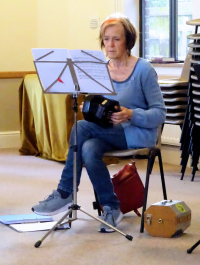 Sight-reading is a chance for members to nominate a tune for the group, either
from Hardy or from our own tunebook. Tunes
should be within the range of instruments in the group, which I will check
before we play. The person who nominates the tune starts the tune, normally
with a 4 or 8 bar intro.
Sight-reading is a chance for members to nominate a tune for the group, either
from Hardy or from our own tunebook. Tunes
should be within the range of instruments in the group, which I will check
before we play. The person who nominates the tune starts the tune, normally
with a 4 or 8 bar intro.
We play from the music in front of us at the speed set at the start, so that we are all playing the same version, to avoid discords.
Second parts (harmonies) are provided for some tunes. First time through a tune we all play the melody.
We try to listen to the other players and do not drown them out.
We do not criticise wrong notes and we do not allow snippy remarks about anyone’s playing.
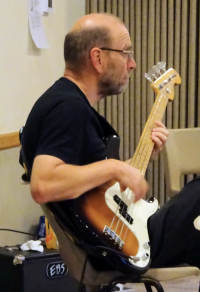 I make sure that we cover the whole programme on the night, to ensure that
practice time is rewarded.
I make sure that we cover the whole programme on the night, to ensure that
practice time is rewarded.
Philosophy
Finally, it is my deliberate policy to run a well organised (some might say formal) evening where the less experienced can gain confidence and no-one is competing to be the best or fastest or loudest or widest repertoire player. There are sessions nearby that are less formal and less structured. If my event does not suit then I can direct you to these other sessions.
Joining the group
We do not run formal auditions. We do expect that players are reasonably proficient on their instrument and can read music – the hear us page gives some examples. If you think that TFMW might be for you, please use the enquire page to get in touch, saying what instrument you play, and we will follow up.
Instruments
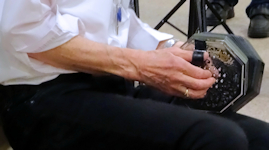 The group is aimed at players of acoustic melody instruments in C with
at least two octaves’ range. Typically flute, violin, recorder, acoustic
guitar, mandolin, concertina, melodeon. We reserve the right to manage the
balance of instruments in the group, which might mean a waiting list for
some instruments. Transposing instruments are not supported. Please
check with us that your instrument is suitable
and there will be room for it without upsetting the balance of instruments.
The group is aimed at players of acoustic melody instruments in C with
at least two octaves’ range. Typically flute, violin, recorder, acoustic
guitar, mandolin, concertina, melodeon. We reserve the right to manage the
balance of instruments in the group, which might mean a waiting list for
some instruments. Transposing instruments are not supported. Please
check with us that your instrument is suitable
and there will be room for it without upsetting the balance of instruments.
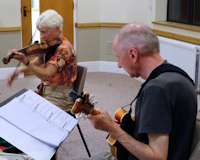
Reading music
Players need to be able to read treble clef scores (& chord symbols) for pieces in F, C, G, D & A and their relative minors (one ♭ to three ♯s) – see Scores for examples. We do not support tab.
Typical skills levels
Skills levels range from Grade 3 to Grade 8 and beyond – that is why the first half is easier paced than the second half. Again, the Scores page gives examples.
Best regards,
—Colin McEwen
If you are interested in coming along to see if the event suits you, then please contact us to check that we are running and that there is space for your instrument.
¹as of January 2024 – subject to change
To hear Colin discussing the ideas that shape the group, here’s a 10-minute podcast created by RG10 magazine:
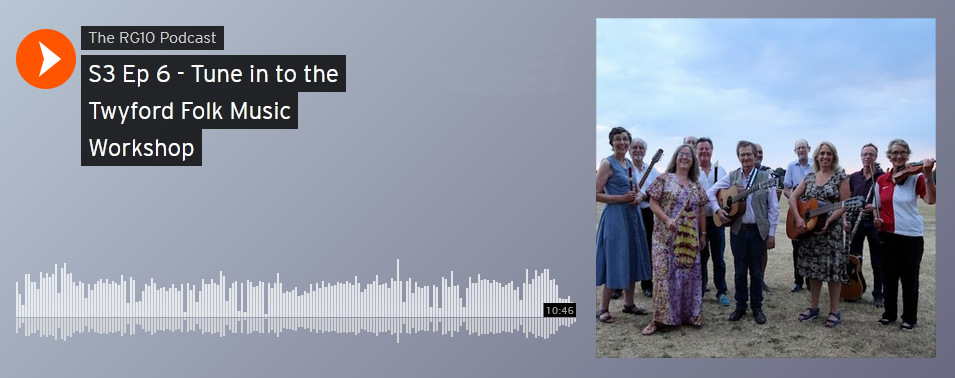
Recorded October 2021
